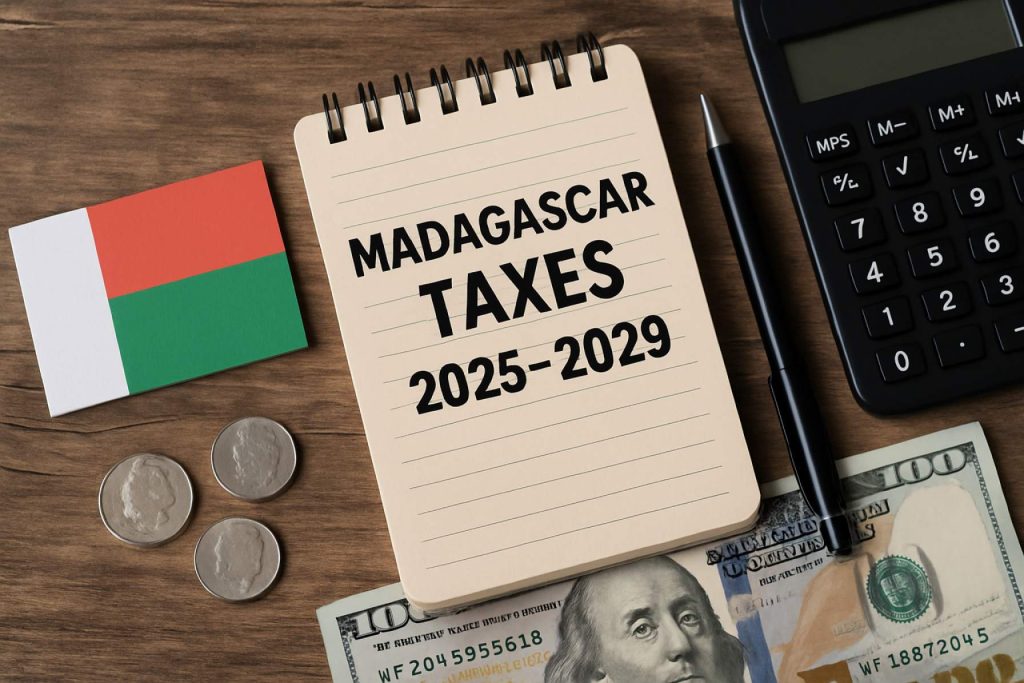
Table of Contents
- Introduction: Madagascar’s Tax Landscape in 2025
- Key Tax Authorities and Official Resources
- Personal Income Tax: Current Rates and Changes
- Corporate Taxation: New Regulations and Compliance
- VAT and Indirect Taxes: What’s New for 2025
- Tax Filing, Payment, and Penalties: Step-by-Step Compliance
- Cross-Border Taxation: International Business Implications
- Latest Government Reforms and Announced Updates
- Key Statistics: Revenue, Compliance, and Enforcement
- Looking Ahead: Madagascar Tax Outlook Through 2029
- Sources & References
Introduction: Madagascar's Tax Landscape in 2025
Madagascar’s tax landscape in 2025 reflects both the country’s evolving economic priorities and its ongoing efforts to modernize fiscal administration. As the government seeks to increase domestic revenue mobilization in line with the National Development Plan, tax reforms and digitalization initiatives have become central to policy. Madagascar’s tax system is administered by the Direction Générale des Impôts (DGI) under the Ministry of Economy and Finance, which oversees direct and indirect tax collection, compliance, and enforcement.
The principal taxes levied in Madagascar include the corporate income tax (Impôt sur les Revenus, or IR), value-added tax (VAT), personal income tax, and a range of indirect taxes and customs duties. For 2025, the standard corporate income tax rate remains at 20%, while VAT is set at 20% on most goods and services. Small businesses may be eligible for a simplified tax regime. The DGI has intensified its push for electronic filing and payment platforms, aiming to improve transparency, reduce compliance costs, and broaden the tax base.
Recent years have seen significant legislative changes. The Loi de Finances 2024 introduced enhanced anti-avoidance measures, stricter penalties for non-compliance, and incentives for investment in priority sectors. In 2025, these provisions are being further refined, with continued alignment to international standards on tax transparency and the fight against illicit financial flows. The government is also working to improve tax administration capacity and auditing, in cooperation with international partners.
Tax revenue as a percentage of GDP has historically been low in Madagascar, hovering around 11%–12% in the early 2020s—substantially below the Sub-Saharan African average. However, the Ministry of Economy and Finance has set ambitious targets to increase this ratio through improved collection and reduced tax evasion. The DGI reported record tax receipts in 2023, and preliminary data from early 2025 suggest further growth, attributed to better compliance and an expanding formal sector.
Looking ahead, Madagascar’s tax outlook for the next few years is shaped by continued digital transformation, efforts to formalize the economy, and legal reforms aimed at fairness and efficiency. While challenges remain—such as informality, administrative bottlenecks, and limited taxpayer education—the government’s commitment to fiscal modernization is expected to gradually enhance both revenue performance and the quality of public services.
- Direction Générale des Impôts
- Ministère de l'Économie et des Finances
- Assemblée Nationale (Loi de Finances)
Key Tax Authorities and Official Resources
Madagascar’s tax system is administered and overseen by several key government bodies, with the Ministry of Economy and Finance at the core of policy, regulation, and enforcement. The primary authority responsible for tax collection, compliance, and taxpayer services is the General Directorate of Taxes (Direction Générale des Impôts, DGI), which operates under the Ministry. The DGI manages direct and indirect taxes including corporate income tax, value-added tax (VAT), personal income tax, and other levies. Its official portal provides access to tax codes, forms, guidance, and online services for individual and business taxpayers (Direction Générale des Impôts).
Customs duties and border taxes are regulated by the General Directorate of Customs (Direction Générale des Douanes, DGD), which oversees import/export duties, excise, and related compliance matters. The DGD provides regulatory updates, tariff schedules, and digital customs clearance services via its official website (Direction Générale des Douanes).
For social security contributions, which are mandatory for employers and employees, the National Social Security Fund (Caisse Nationale de Prévoyance Sociale, CNaPS) is the official agency responsible for collection, compliance, and benefit administration. The CNaPS offers information and digital services on registration, contributions, and entitlements (Caisse Nationale de Prévoyance Sociale).
Legislation and official tax regulations are published by the Ministry of Economy and Finance, which also provides annual Finance Laws, explanatory notes, and sectoral updates on fiscal policy. The Ministry’s website serves as the primary source for legal texts, decrees, and regulatory news (Ministère de l’Économie et des Finances).
- Direction Générale des Impôts: Direct and indirect taxes, taxpayer guidance, forms, and e-services.
- Direction Générale des Douanes: Customs, excise, import/export compliance.
- Caisse Nationale de Prévoyance Sociale: Social security contributions and employer obligations.
- Ministère de l’Économie et des Finances: Tax laws, Finance Laws, official publications.
For up-to-date compliance requirements, tax rates, forms, and legal updates for 2025 and beyond, these authorities’ official websites remain the authoritative resources for taxpayers and professionals operating in Madagascar.
Personal Income Tax: Current Rates and Changes
As of 2025, personal income tax (PIT) in Madagascar continues to be governed by the provisions outlined in the Malagasy General Tax Code, with ongoing reforms aimed at improving compliance and broadening the tax base. The personal income tax system primarily operates on a progressive scale, applicable to individuals earning income from employment, business activities, and other personal sources.
For employees, the principal mechanism for PIT collection is the “Impôt sur les Revenus Salariaux et Assimilés” (IRSA), which is withheld at source by employers. The IRSA rates for 2025 remain on a progressive sliding scale, with the following bands:
- 0% for monthly income up to MGA 350,000
- 5% for income between MGA 350,001 and MGA 400,000
- 10% for income between MGA 400,001 and MGA 500,000
- 15% for income between MGA 500,001 and MGA 600,000
- 20% for monthly income exceeding MGA 600,000
There is a minimum monthly tax obligation of MGA 2,000, regardless of income level. The IRSA is applicable not only to salary but also to most forms of employment income, including bonuses and fringe benefits. Taxable income is calculated after permitted deductions, such as mandatory social security contributions (Direction Générale des Impôts).
Self-employed individuals and those earning non-salary income are required to file annual tax returns under the “Impôt sur les Revenus des Personnes Physiques” (IRPP), subject to progressive rates that mirror the IRSA structure. The tax authorities have intensified outreach and enforcement, leveraging digital platforms for filing and payment to improve compliance and reduce evasion.
Recent amendments to the General Tax Code—implemented in late 2023 and effective from January 2024—introduced stricter penalties for non-compliance and simplified procedures for taxpayers with modest incomes, aiming to encourage formalization and voluntary registration. The government has also increased the threshold for taxable income, to reflect inflation and promote equity (Ministère de l’Économie et des Finances).
Key statistics indicate that PIT revenue continues to represent a modest share of total tax collection, with efforts ongoing to increase the tax-to-GDP ratio. The outlook for 2025 and the coming years includes further digitalization of the tax administration system, targeted taxpayer education campaigns, and potential legislative adjustments in response to economic conditions and IMF recommendations for fiscal sustainability (International Monetary Fund).
Corporate Taxation: New Regulations and Compliance
In 2025, corporate taxation in Madagascar continues to be governed by the provisions outlined in the Code Général des Impôts (CGI), which is updated annually through the national Finance Law. The most recent Finance Laws—particularly Loi de Finances 2024 and anticipated amendments for 2025—demonstrate the government’s ongoing efforts to modernize tax administration, improve compliance, and broaden the tax base.
The standard corporate income tax (Impôt sur les Sociétés, IS) rate remains at 20% for most resident companies. However, specific sectors, such as insurance and financial institutions, are subject to higher rates. Small and micro-enterprises are eligible for a simplified tax regime, with reduced rates or lump-sum taxation, depending on annual turnover thresholds. In addition, the minimum tax (Impôt Minimum Forfaitaire, IMF) applies to all companies regardless of profitability, ensuring a baseline tax contribution from all registered businesses. The IMF for 2025 has been adjusted in line with inflation and sector-specific considerations (Direction Générale des Impôts).
Recent regulatory changes emphasize stricter documentation requirements for deductible expenses, enhanced transfer pricing controls, and mandatory electronic filing for medium and large taxpayers. The authorities have also intensified efforts to formalize the informal sector and combat tax evasion through digitalization and inter-agency cooperation. In 2024, Madagascar introduced mandatory online submission of tax returns for entities exceeding a prescribed turnover, a measure expected to be broadened in 2025 to include more taxpayers (Ministère de l'Economie et des Finances).
Non-compliance remains a significant challenge, with the informal economy estimated to account for over 40% of GDP. To address this, tax audits and inspections have increased, and the penalty regime for late payment and under-declaration has been reinforced. The government is also rolling out taxpayer education initiatives and incentives for voluntary compliance, particularly targeting newly registered businesses and foreign investors. According to official statistics, corporate tax revenue represented approximately 2.4% of GDP in 2023, with a target to reach 2.7% by 2025 as compliance improves (Ministère de l'Economie et des Finances).
Looking ahead, the outlook for corporate taxation in Madagascar centers on digital transformation, greater enforcement capacity, and gradual alignment with international best practices—particularly in anti-base erosion and profit shifting (BEPS) standards. The tax authority is also exploring incentives for sustainable investment and sector-specific reliefs to support economic diversification, signaling a more dynamic and responsive tax environment for the coming years (Direction Générale des Impôts).
VAT and Indirect Taxes: What’s New for 2025
For 2025, Madagascar’s value-added tax (VAT) and indirect tax landscape reflects ongoing efforts to modernize the fiscal system and broaden the tax base. The standard VAT rate remains at 20%, applied to most goods and services. However, the government continues to refine the scope of exemptions and zero-rated supplies, with notable implications for sectors such as agriculture, education, and health. Recent finance laws have incrementally reduced some sector-specific exemptions to boost revenue mobilization and align with regional tax harmonization goals.
A key development for 2025 is the enhanced digitalization of VAT compliance. The Direction Générale des Impôts (DGI) now mandates VAT-registered businesses to file returns electronically through the “E-Hetraph” platform, streamlining reporting and reducing opportunities for evasion. The DGI has intensified compliance audits, especially among medium and large taxpayers, aiming to close the VAT gap and ensure proper invoice documentation.
Indirect tax reforms extend to excise duties and customs. The 2025 finance law revises excise rates on products such as alcohol, tobacco, and petroleum, both to increase revenue and encourage public health objectives. The Douanes Malagasy have also implemented the “SydoniaWorld” single window for customs declarations, facilitating faster processing and improved traceability, which impacts VAT on imports.
Statistically, VAT remains the largest single source of tax revenue in Madagascar, accounting for approximately 40% of total tax collections in recent years, according to figures from the Direction Générale des Impôts. However, the effective VAT collection rate lags the statutory rate, with compliance challenges among small businesses and the informal sector contributing to a sizable tax gap.
Looking ahead, the government’s medium-term strategy prioritizes expanding the VAT net, further digitalizing indirect tax administration, and harmonizing indirect tax policy with regional standards under the Southern African Development Community (SADC) framework. Businesses operating in Madagascar should expect continued scrutiny of VAT compliance, more stringent documentation requirements, and periodic adjustments to the list of exempt and zero-rated supplies.
In summary, VAT and indirect tax reforms in Madagascar for 2025 focus on digitalization, stricter compliance, and rationalization of exemptions, aiming to strengthen public finances and support the country’s development objectives. Staying abreast of regulatory changes and leveraging electronic compliance platforms will be critical for taxpayers in the evolving landscape.
Tax Filing, Payment, and Penalties: Step-by-Step Compliance
Madagascar’s tax compliance framework in 2025 continues to be governed by the Code Général des Impôts (CGI), with administration and enforcement handled by the Direction Générale des Impôts (DGI). Compliance processes are largely digitalized, with increasing emphasis on taxpayer self-filing and electronic payments.
- Registration: All businesses and self-employed persons must register for a Tax Identification Number (NIF) with the DGI prior to commencing taxable activity. Registration can be completed at regional tax centers or online via the DGI’s official portal.
- Tax Filing: The principal taxes include Corporate Income Tax (IS), Value Added Tax (TVA), personal income tax (IR), and various local levies. For 2025, annual corporate tax returns generally must be filed by April 15 of the year following the tax year, while VAT returns are due monthly by the 15th of the following month. Electronic filing is mandatory for most medium and large taxpayers, with small taxpayers increasingly encouraged to file digitally as part of ongoing modernization (Direction Générale des Impôts).
- Tax Payment: Taxpayers must pay assessed taxes directly into the Treasury’s accounts at authorized banks or via online payment platforms integrated with the DGI site. The payment deadlines align with the filing dates for each tax type. Late payment results in automatic penalties.
- Penalties and Audits: Madagascar applies strict penalties for late filing (usually 10% of the due tax) and late payment (1% per month of delay). In case of underreporting or fraud, penalties can reach up to 100% of the understated tax. The DGI routinely conducts desk audits and field inspections, prioritizing sectors with high risk of evasion (Direction Générale des Impôts).
- Appeals and Disputes: Taxpayers may contest assessments or penalties by submitting an administrative appeal to the DGI, and, if unresolved, escalate to the tax courts. The process and timelines are regulated under the CGI and further detailed on the DGI’s portal.
Recent reforms (2023–2025) have focused on digitizing tax procedures, broadening the tax base, and simplifying compliance for small businesses. The outlook for the next few years includes enhanced electronic systems, real-time payment tracking, and stricter enforcement measures. Continued capacity-building and taxpayer education are also priorities, aiming to improve Madagascar’s tax-to-GDP ratio and ensure sustainable revenue collection (Direction Générale des Impôts).
Cross-Border Taxation: International Business Implications
Madagascar’s approach to cross-border taxation is evolving as the country seeks to attract foreign direct investment (FDI) while complying with international tax standards. As of 2025, Madagascar operates under a territorial tax system, taxing only income sourced within its borders. Resident companies are subject to corporate income tax (CIT) on their locally derived profits, while non-residents are taxed only on their Malagasy-sourced income. The standard CIT rate remains at 20%, with certain sectors, such as export processing zones, eligible for preferential rates and incentives designed to stimulate cross-border economic activity (Direction Générale des Impôts).
Madagascar has undertaken significant tax reforms in recent years to improve compliance and transparency in line with international recommendations. Notably, the country joined the Inclusive Framework on Base Erosion and Profit Shifting (BEPS) in 2022, committing to implement minimum standards such as country-by-country reporting for multinational groups and measures to prevent treaty abuse (Organisation for Economic Co-operation and Development). In practice, this means that international businesses operating in Madagascar must now consider stricter documentation requirements for transfer pricing and demonstrate that cross-border transactions with affiliates are conducted at arm’s length.
For withholding taxes, payments to non-residents—including dividends, interest, royalties, and service fees—are generally subject to a 10% withholding tax unless reduced by an applicable tax treaty. Madagascar has signed a limited number of double tax agreements (DTAs), including with France and Mauritius, which can offer relief from double taxation and reduce withholding rates under certain conditions (Direction Générale des Impôts).
From a compliance standpoint, companies engaged in cross-border transactions must file annual tax returns, maintain contemporaneous transfer pricing documentation, and comply with electronic filing systems introduced by the tax authority. The Malagasy government has made digitalization and improved enforcement a priority, rolling out e-services and spot audits to enhance tax collection from international businesses.
Looking ahead, Madagascar is expected to further align its tax legislation with global standards, including potential reforms to address the digital economy and more robust anti-avoidance rules. With international scrutiny increasing and domestic revenue pressures mounting, multinational enterprises should anticipate heightened compliance obligations and monitor legislative developments closely (Direction Générale des Impôts).
Latest Government Reforms and Announced Updates
In recent years, Madagascar has undertaken a series of tax reforms aimed at improving compliance, broadening the tax base, and enhancing state revenues. The Malagasy government’s reform agenda, as outlined in its Budget Laws and fiscal policy statements, is guided by the objectives of increasing fiscal transparency and modernizing tax administration to better support public services and economic growth.
For 2025, the government continues to implement measures set out in the Direction Générale des Impôts (DGI)’s modernization plan. A central focus remains on the digitalization of tax procedures, including the expansion of the online tax filing and payment system, “e-Hetrafika,” which is now mandatory for medium and large enterprises. These efforts are designed to reduce administrative bottlenecks, limit opportunities for fraud, and facilitate taxpayer compliance.
The 2024 Loi de Finances (Finance Law), which sets the framework for 2025, introduced specific updates such as adjustments to the corporate income tax (CIT) regime. The standard CIT rate remains at 20%, but the law has enhanced tax incentives for companies investing in priority sectors, notably renewable energy and agro-processing. Micro and small enterprises benefit from a simplified presumptive tax regime, while large taxpayers are now subject to stricter reporting and audit measures. The minimum tax threshold and certain VAT exemptions have also been revised to capture more economic activity within the formal sector (Ministère de l’Économie et des Finances).
On the compliance front, the DGI has strengthened its audit capacity, leveraging new risk assessment tools and cross-agency data sharing. The recent adoption of taxpayer identification numbers (NIF) for all businesses and professionals is expected to further improve compliance and reduce informality. According to the DGI, these measures contributed to a 12% increase in tax revenues in 2023, with continued growth projected for 2024–2025 (Direction Générale des Impôts).
- Key statistics: Tax-to-GDP ratio is projected to reach 12.5% in 2025, up from 11.3% in 2022, reflecting improved collection efforts and economic recovery (Ministère de l’Économie et des Finances).
- Outlook: The government aims for further reform in the coming years, with proposals under discussion to rationalize tax expenditures, align VAT rates, and strengthen enforcement in the informal sector.
Ongoing reforms and digitalization are expected to strengthen Madagascar’s fiscal position, though challenges remain in expanding the tax base and ensuring equitable burden-sharing across sectors. The outlook for 2025 and beyond is cautiously optimistic, contingent on sustained administrative modernization and policy continuity.
Key Statistics: Revenue, Compliance, and Enforcement
As Madagascar continues to pursue fiscal consolidation and economic development, taxation remains a central focus of public policy. In 2025, the government is intensifying efforts to increase tax revenue, enhance compliance, and strengthen enforcement measures.
- Revenue Performance: According to the most recent data published by the Direction Générale des Impôts (DGI), tax revenues accounted for approximately 10.3% of GDP in 2023, with targets set to raise this ratio to 11.5% by the end of 2025. The government’s 2025 finance law aims to boost state revenues through expanded tax bases, improved collection methods, and a focus on broadening the formal economy.
- Key Tax Types and Rates: The principal taxes include corporate income tax (CIT) at a standard rate of 20%, personal income tax (PIT) with progressive rates from 0% to 20%, and value-added tax (VAT) at 20%. These rates remained stable in the 2025 budget, though the government announced targeted incentives for priority sectors such as agribusiness and renewable energy to stimulate investment.
- Compliance and Digitalization: The DGI continues to modernize tax administration, expanding the “e-Hetraph” electronic filing and payment system. In 2024, over 85% of large taxpayers filed returns electronically, a figure projected to exceed 90% in 2025. This push for digital compliance aims to reduce errors, leakages, and administrative burdens (Direction Générale des Impôts).
- Enforcement and Audits: Madagascar is stepping up audit activity and combating tax evasion, especially in the mining, telecommunications, and finance sectors. In 2024, the DGI reported a 17% increase in tax audits compared to the previous year, with additional assessments totaling MGA 130 billion (Direction Générale des Impôts). New cooperation frameworks with customs and anti-corruption agencies are being implemented to further improve enforcement outcomes.
- Outlook: Despite structural challenges such as informality and limited administrative capacity, ongoing reforms and investments in digital tools are expected to yield incremental improvements in revenue collection and compliance rates through 2026. The government’s medium-term fiscal strategy targets a tax-to-GDP ratio of 13% by 2027, aligning with regional averages and supporting Madagascar’s development objectives (Ministère de l’Économie et des Finances).
Looking Ahead: Madagascar Tax Outlook Through 2029
Madagascar’s tax landscape is undergoing significant evolution as the government seeks to strengthen domestic resource mobilization, improve compliance, and attract investment. The country’s tax policy for 2025 and the years leading up to 2029 is shaped by a series of reforms, digitalization efforts, and a focus on broadening the tax base. Madagascar’s legal framework is primarily defined by the General Tax Code (Code Général des Impôts, CGI), which is updated annually through the Finance Law. The Ministère de l’Economie et des Finances (Ministry of Economy and Finance) and the Direction Générale des Impôts (DGI) oversee the administration and enforcement of tax laws.
In the 2025 Finance Law, key measures include a continued commitment to modernizing tax administration and enhancing VAT collection, which remains a major source of revenue. The standard VAT rate remains at 20%, while the corporate income tax (CIT) rate is generally 20%, with reduced rates for certain sectors and small enterprises. Recent reforms focus on combating tax evasion, improving taxpayer identification systems, and expanding the use of digital platforms for declarations and payments. For example, the DGI’s online tax portal, launched in recent years, is expected to expand its functionalities through 2029, facilitating easier compliance and reducing the informal sector’s footprint (Direction Générale des Impôts).
Madagascar’s tax-to-GDP ratio remains below the Sub-Saharan African average, estimated at around 10.5% as of 2023, prompting ongoing pressure from international partners and the government to improve tax efficiency and coverage. The government’s medium-term strategy, as outlined in its latest fiscal policy documents, targets a gradual increase in tax revenue mobilization through enhanced enforcement, audits, and broadening the base—especially among the self-employed and informal businesses (Ministère de l’Economie et des Finances).
Looking ahead to 2029, Madagascar is expected to continue prioritizing digital transformation, public awareness campaigns, and legislative adaptations to global tax trends, including transfer pricing and anti-avoidance measures. The government is also exploring tax incentives in strategic sectors, such as renewable energy and agro-processing, to attract foreign direct investment. However, challenges remain, including capacity constraints within tax administration and persistent informality in the economy.
In summary, Madagascar’s tax outlook for 2025–2029 is characterized by incremental modernization, strengthened compliance mechanisms, and efforts to align with international best practices. These steps aim to increase revenue, foster economic stability, and support national development objectives (Direction Générale des Impôts).



